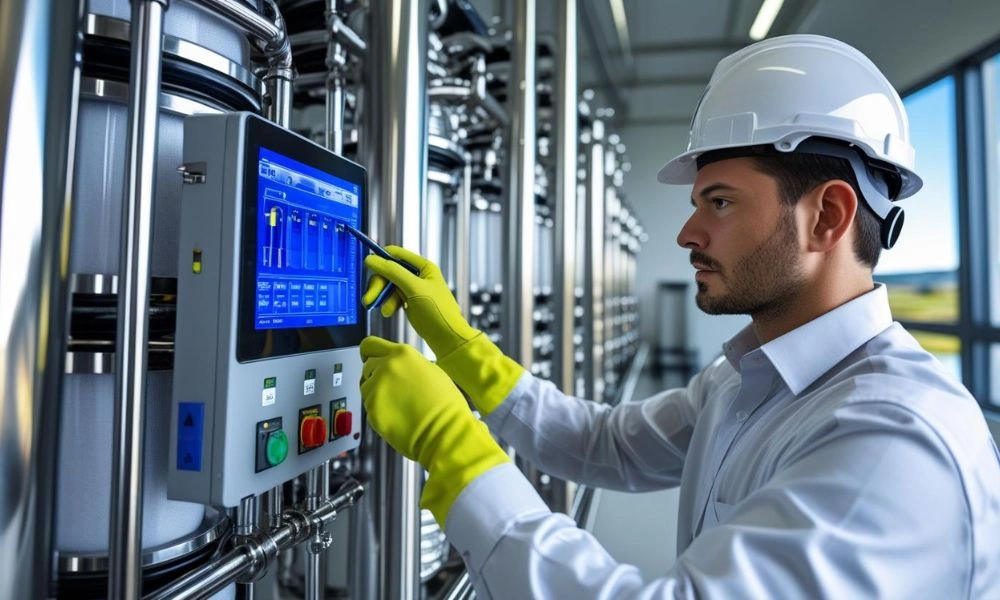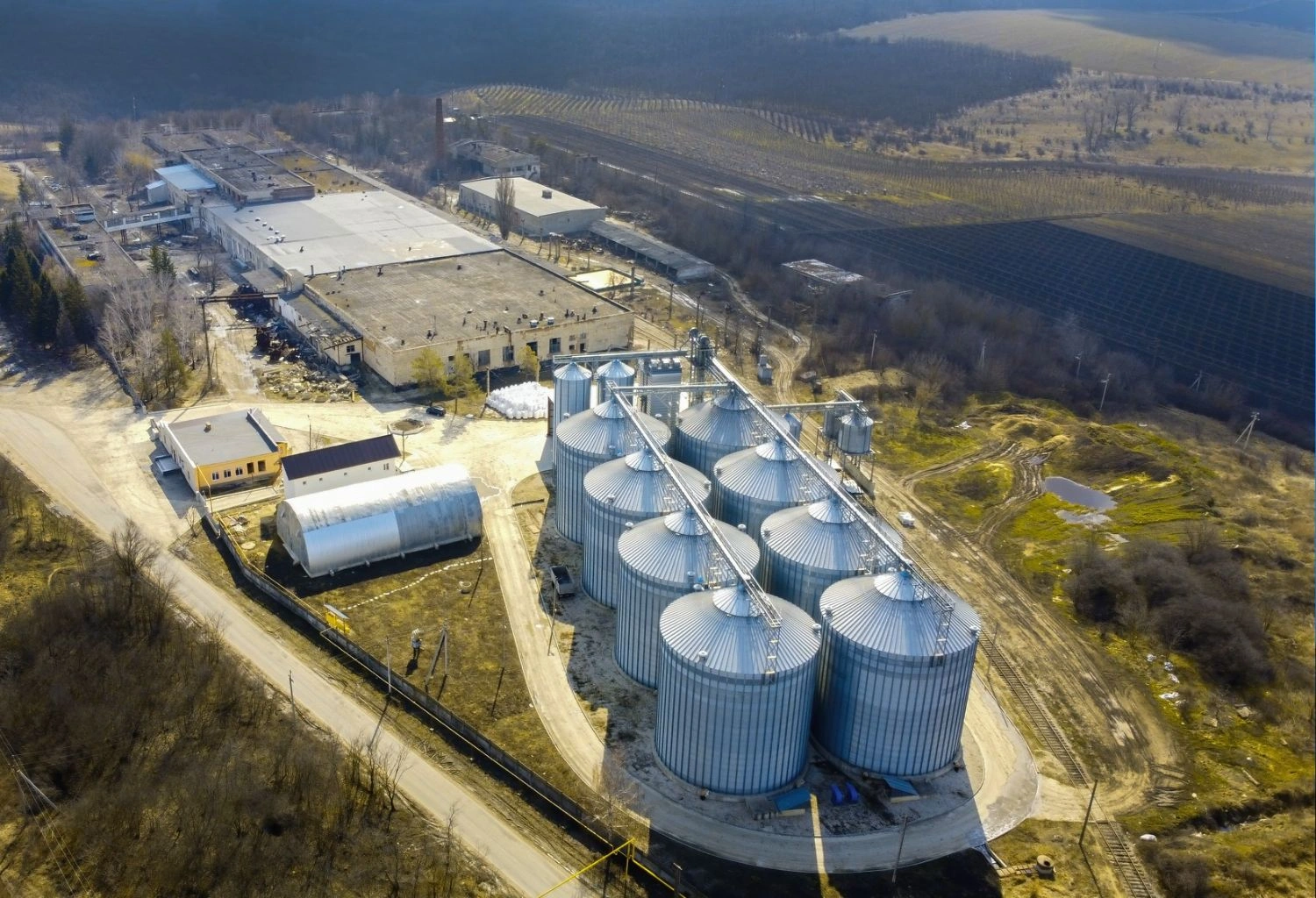Filtration water plant maintenance is crucial for system efficiency, safety, and sustainability. From filter cleaning to smart monitoring, adopting best practices ensures uninterrupted performance and long-term savings. WCSP provides expert, ISO-certified support across Pakistan, offering AMC plans, local expertise, and advanced tools that ensure your water treatment systems remain reliable and compliant.
Ultra-filtration Water Plant
Why is filtration water plant maintenance so important?
Clean water is critical to public health, industrial processes, and agricultural yield. In Pakistan, water filtration plants are the key to providing safe and usable water. But having a filtration plant installed isn’t sufficient—periodic, proper filtration water plant maintenance is essential to provide consistent performance, cost-effectiveness, and long-term reliability.
Water Care Services Pakistan (WCSP), having ISO-certified systems and international technologies, emphasizes the significance of planned maintenance for municipal and industrial water filtration plants. This article discusses critical filtration water plant maintenance best practices that must be implemented for each setup.
Why Regular Maintenance is a Must for Filtration Plants?
Industrial or municipal filtration plants are under stress due to impurities, high flow rates, and variability in source water quality. In the long run, this results in:
- Clogging of membrane and filters.
- Pressure drops throughout the system.
- Bacterial growth and scaling.
- Energy consumption increases.
- Breakdowns and reduced efficiency.
Proper maintenance of filtration water plant ensures maximum performance, safeguards infrastructure investment, and keeps the water quality according to health and safety standards.
The major components that need regular maintenance are:
Pre-Filtration Units
Sand filters, cartridge filters, or multimedia filters must be backwashed or replaced on a regular basis to prevent sediment accumulation.
Membranes and Cartridges
RO membranes and microfilters become less effective because of fouling. The processes of regular chemical cleaning and prompt replacement are necessary.
Pumps and Valves
Motors and valves need lubrication, calibration, and periodic leak and wear inspection to maintain continuous pressure and flow.
Control Panels and Sensors
SCADA and IoT sensors must be updated, recalibrated, and backed up to maintain automation running and intact.
UV Lamps and Dosing Pumps
For UV or chlorine-dosing systems, lamps should be replaced every year, and pumps should be checked for dosage accuracy.
Best Practices for Filtration Water Plant Maintenance
Establish a Preventive Maintenance Schedule
Use manufacturer recommendations and site-specific performance data to develop a systematic monthly, quarterly, and yearly maintenance check list.
Use Real-Time Monitoring System
Install smart sensors and meters to monitor TDS, pH, flow, and pressure—the critical parameters that alert when maintenance is needed.
Maintain Detailed Logs and Documentation
Keep records for filter changes, membrane cleaning, motor service, and breakdowns. This facilitates predictive maintenance planning.
Train Onsite Technicians
Regularly train operators of plants on troubleshooting, preventive maintenance, and safety procedures to minimize reliance on external assistance.
Utilize Only Certified Spare Parts and Chemicals
Subpar parts or cleaning chemicals can impair system integrity and invalidate warranties. Always use ISO- and NSF-certified replacements.For UV or chlorine-dosing systems, lamps should be replaced every year, and pumps should be checked for dosage accuracy.
Organize Third-Party Inspections
Regular audits by experts such as WCSP guarantee that systems comply with national (NEQS) and international standards of water safety and operating efficiency.
How WCSP Excels in Maintenance and Support?
Water Care Services Pakistan provides complete filtration water plant maintenance packages, including:
- Annual Maintenance Contracts (AMC).
24/7 emergency support and remote troubleshooting. - Regular on-site visits and full performance reporting.
- Ready stock availability of top-grade parts and consumables.
- Tailored maintenance planning for different industries.
WCSP’s skilled engineers and intelligent diagnostic equipment help ensure maximum plant uptime, even in distant or industrial areas.
- Environmental and Cost Benefits of Proactive Maintenance.
- Water Conservation: Clean filters and membranes increase recovery levels, cutting down water wastage.
- Energy Conservation: Lower fouling decreases energy consumption per liter treated.
- Longer Lifespan: Maintaining capital-intensive hardware increases its lifespan.
- Lower Downtime: Preventive maintenance prevents unexpected failures, averting expensive shutdowns in production or supply.
Demineralization Water System
Challenges in Maintenance and How to Overcome Them Challenge Solution
- Lack of technical skills WCSP offers on-site training and remote support.
- Shortage of spare parts Maintain stock with WCSP’s local supply chain.
- Ignoring maintenance schedules Use digital alerts or contract WCSP AMC services.
- Scaling and biofouling Conduct regular chemical clean-in-place (CIP) sessions.
- Role of Localized Maintenance Strategy in Pakistan
Because raw water sources vary (groundwater, canal, municipal), filtration water plant maintenance in Pakistan has to be local area-specific. For instance:
- Karachi: High TDS—membranes require frequent cleaning.
- Lahore: High sediment load—sand filters clog quickly.
- Faisalabad: Industrial effluent—pre-treatment stages need to be stringent.
WCSP offers customized plans based on on-site water testing and decades of localized experience.
Conclusion
Water filtration plants are the cornerstone of Pakistan’s urban and industrial water security. But neglected, these assets can become liabilities. Smart, proactive approach to filtration water plant maintenance ensures water safety, operational efficiency, and cost savings. With a focus on high-quality services, technical expertise, and local relevance, WCSP is the best choice of partner for long-term reliability of the plant.
Frequently Asked Questions (FAQs)
Why is filtration water plant maintenance important?
It ensures clean, safe water by preventing breakdowns, minimizing energy use, and prolonging system life. Regular care avoids contamination, costly repairs, and system inefficiency in industrial and municipal plants.
What are the most common maintenance issues?
Clogged filters, fouled membranes, pressure drops, and bacterial buildup are common. Ignoring them leads to poor water quality and higher operational costs, making regular checks essential.
How often should filters be cleaned or replaced?
Pre-filters should be backwashed weekly or replaced monthly based on usage. Regular monitoring of pressure drops helps determine the exact replacement interval for optimal filtration performance.
What maintenance is needed for RO membranes?
RO membranes require chemical cleaning every 3–6 months and replacement every 2–3 years depending on fouling, TDS levels, and recovery rate performance under operating conditions.
How does WCSP support filtration plant maintenance?
WCSP offers AMC plans, expert training, emergency response, certified spare parts, and on-site inspections to ensure water filtration systems remain efficient, safe, and regulatory compliant.
What role do SCADA and IoT sensors play?
They provide real-time data on pH, TDS, and pressure. Automated alerts enable predictive maintenance, reduce downtime, and support remote monitoring from anywhere for smarter plant operation.
Why are certified spare parts important?
Using ISO- and NSF-certified parts ensures system integrity, avoids performance compromise, extends warranty coverage, and enhances plant safety and efficiency in the long term.
How can maintenance reduce energy consumption?
Clean membranes and filters improve flow rates and reduce pump load, lowering overall electricity use per liter treated. Efficient equipment directly saves energy and operational costs.
What’s the benefit of WCSP’s localized strategies?
WCSP customizes maintenance plans by city and water source—handling Karachi’s high TDS, Lahore’s sediments, or Faisalabad’s industrial waste—ensuring targeted performance and cost-effective solutions.
How does preventive maintenance help avoid downtime?
Scheduled servicing prevents sudden breakdowns, allows early detection of issues, and ensures uninterrupted water supply—especially vital in industries where shutdowns cause heavy losses.



